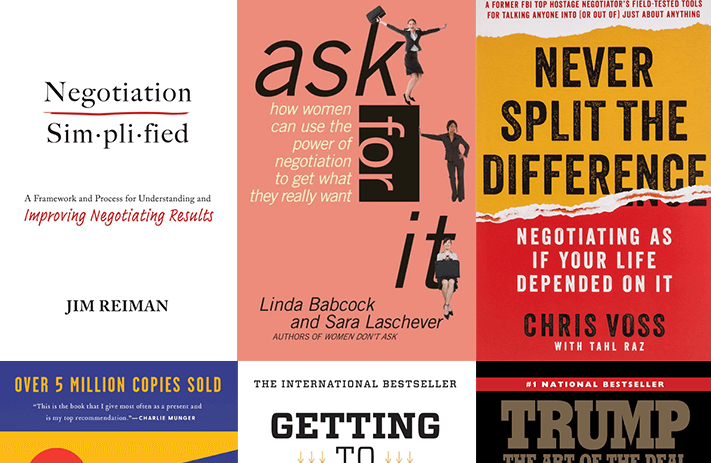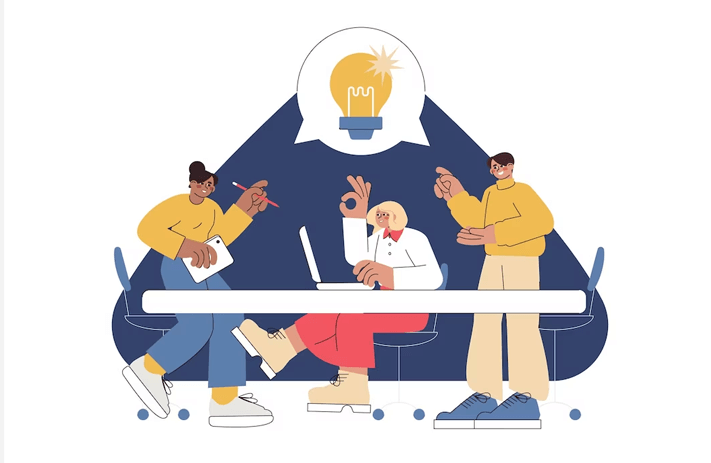
Click the button to start reading
Wanna Know When to Hold and When to Fold? Here’s Your Guide to the Best Books on Negotiation
On any day of the week, most of us find ourselves saying things like, “He drives a hard bargain,” “She didn’t give me an inch” and “He’s a real pushover.”
Yet while negotiation is a part of our everyday lives, for many it’s still shrouded in mystery. We don’t understand how people we know always seem to get their way, or how others routinely charm customer service representatives, receiving perks and freebies galore.
And we’re well aware of what this lack of understanding costs us. It may mean that we don’t get the raise we know we deserve, or that we overpay for a much-needed vehicle, as we have no idea how to bring the seller down.
Shrewd negotiation can mean the difference between eating a dinner you like and one you can hardly keep down, between sleeping on a delightful, comfortable mattress or one that’s too hard and impossible to fall asleep on. It can mean the difference between receiving a generous Christmas bonus and one that hardly pays the electricity bill. And in some instances, it can mean the difference between life and death.
With the stakes so high, what’s stopping us from climbing into the ring and asking for what we want?

Many of us hold deeply entrenched beliefs about negotiation that keeps us safely on the sidelines. Some believe you’re either born with negotiating chops or you aren’t. So when these people don’t see a natural tendency to bargain within themselves, they don’t put out any effort. Others believe the tough negotiators live in a “you only eat the meat that you kill” kind of a world. Everything is a competition and every interaction determines a winner and a loser. And they don’t want to have any part of it.
Yet, many have disregarded these beliefs. They don’t shy away from bringing their desires to the table, and they’re getting what they want. They earn what they’re due and they purchase their homes at great prices.
Still more have found these beliefs to be false. They know that negotiation is not a trait that’s inherited. It’s not a zero-sum game, where if one person gains the other loses. It’s not a messy conflict that naturally leads to burnt bridges. Believe it or not, you can have your cake, eat it and share a slice with everyone else at the boardroom table. Does that sound like an offer you can’t refuse?
If you’re ready to build some negotiating skills, then dig in. We’re going to look at what the shrewdest wheelers and dealers have to say in this guide to the best books on negotiation.
Negotiation Simplified: A Framework and Process for Understanding and Improving Negotiating Results by Jim Reiman
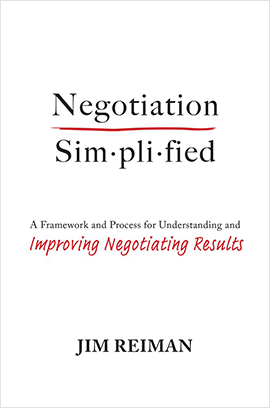 Publisher: Amplify Publishing
Publisher: Amplify Publishing
Year Published: 2022
Number of Pages: 216
Are you tired of books that speak down to you? Or books that go on and on about a concept that could easily be summarized in a few sentences? If so, then Negotiation Simplified is for you.
Author Jim Reiman finds that the other books on negotiation are either too complicated or too simple. His book is neither. It’s the Goldilocks book that aims to “to simplify without being simplistic.”
“Negotiation Simplified is written by a practitioner for the practitioner. It assumes that the reader is intelligent and brings some experience, so you will find no rote set of steps to follow. Rather, it provides a method to analyze and frame situations and facts.”
Reiman pares negotiation down to its leanest form. It’s a great book for anyone new to the topic who’s learning the basics.
“Achieving great negotiating results requires only four skills…they are setting clear goals, being prepared, listening and being self aware.”
The chapters cover things such as preparation (including planning, strategy and tactics) and common negotiation challenges. In the chapter “Experience Speaks”, Reiman illustrates how his ideas apply in the real world, with anecdotes from a variety of professionals.
This book is quiet and direct and super easy to read. A lot is packed into its 216 pages.
Reiman is a lawyer and has also worked as the CEO of several companies, including a cell phone company in China that he expanded from a small chain of stores into a public company sold on the London Stock Exchange.
Readers have found this book helpful in all sorts of scenarios, from buying a home to negotiating pay and opportunities in the workplace.
Influence, New and Expanded: The Psychology of Persuasion by Robert Cialdini, PhD
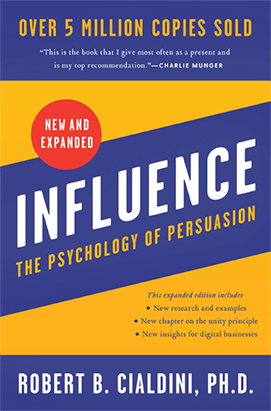 Publisher: Harper Business
Publisher: Harper Business
Year Published: 2021
Number of Pages: 592
Do you ever find yourself saying “yes” to something you don’t want to do at all? Maybe it’s agreeing to watch your neighbor’s dog while she’s on summer vacation (because she watered your garden when you were out of town that spring).
In Influence, author Robert Cialdini breaks down the psychology behind persuasion and influence, both of which are integral to negotiation. We don’t agree to something simply because it’s what we want. Each of us is far more prone to manipulation or automatic behavior than we’d like to believe.
“[The experts] have identified regular, blindly mechanical patterns of action in a wide variety of species…we, too, have our preset programs, and although they usually work to our advantage, the trigger feature that activates them can dupe us into running the right programs at the wrong time.”
First published in 1984, Influence has sold over five million copies. This newest version includes Cialdini’s expanded understanding on the topic, including an 8th Chapter titled “Unity.”
Influence offers more than a peek behind the curtains into the psychology of negotiation, making it a great read for anyone who’s looking for more than a surface-level understanding of the topic.
He breaks persuasion down into eight distinct methods: reciprocation, liking, social proof, authority, scarcity, commitment and consistency and unity. He incorporates stories and case studies to explain how each method works in real life. He’s quick to explain how we can ethically use these ideas to our advantage.
At nearly 600 pages, Influence is an investment of anyone’s time. But it’s worth it. Although some of the stories and anecdotes sound dated, the lessons are timeless. And Cialdini’s friendly tone makes him sound more like a companion than a lecturer.
Known as the “Godfather of Influence”, Cialdini’s council is highly sought-after in the fields of marketing, politics and business. Currently, he’s the CEO of Influence at Work, where he gives talks and trainings. He also wrote the book, Pre-Suasion: A Revolutionary Way to Influence and Persuade.
His content (not his personality) is very similar to Tony Robbins; it’s all about the psychology behind negotiation. You’ll even hear the two of them using the same anecdotes from time to time.
Never Split the Difference: Negotiating as if Your Life Depended on It by Chris Voss, with Tahl Raz
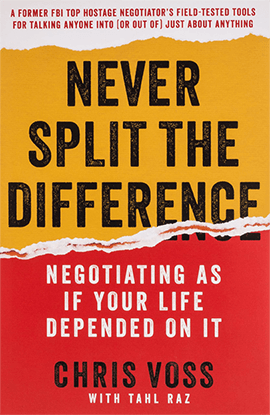 Publisher: Harper Business
Publisher: Harper Business
Year Published: 2016
Number of Pages: 288
Most of us won’t ever be in a negotiation with a kidnapper or terrorist, arguing over millions of dollars where the stakes are life and death. But for Chris Voss, author of Never Split the Difference, these sorts of negotiations were part of his regular workday.
Voss spent over two decades at the FBI as the lead kidnapping investigator. He cut his teeth negotiating with criminals who threatened to spare the lives of innocent children only in exchange for money. And over this time he developed a hands-on system that worked.
“In the twenty years I spent at the Bureau we’d design a system that had successfully resolved almost every kidnapping we applied it to. But we didn’t have grand theories.”
Voss presents his system amidst engrossing stories, and convinces the reader that negotiation is a life skill that everyone needs to keep sharp and carry at all times.
“Over the years I had picked up skills, tactics and a whole approach to human interaction that had not just helped me save lives but, as I recognize now looking back, had also come to transform my own life. My years of negotiating had infused everything from how I dealt with customer service representatives to my parenting style.”
Voss takes a street-wise approach to negotiation, one not rooted in academia or theories, but in the gritty world of criminals and thugs. One of his tactics is an open-ended question, which has no fixed answer. It buys the negotiator time, and lets the other side think the ball is in their court. Another tip includes pacing yourself in a negotiation; “going too fast is one of the mistakes all negotiators are prone to making.”
Never Split the Difference is written in ten chapters, including: “Trigger the Two Words That Immediately Transform Any Negotiation” and “Find the Black Swan: How to Create Breakthroughs by Revealing the Unknown Unknowns.”
It’s an intense read, and he frames all negotiations like they’re a win-or-lose competition. His method is all about giving you the edge. It’s a story-driven book, and only a small portion of the content covers the how-to of his method.
After his career with the FBI, Voss pursued a career in academia, working as an adjunct professor at Harvard and Georgetown. He is also the CEO of his organization, The Black Swan Group.
Ask for It: How Women Can Use the Power of Negotiation to Get What They Really Want by Linda Babcock and Sara Laschever
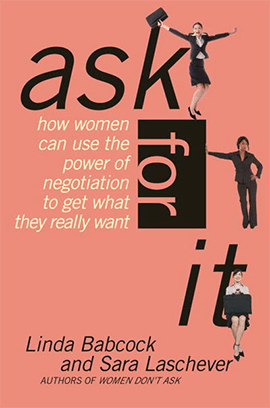 Publisher: Bantam Books
Publisher: Bantam Books
Year Published: 2009
Number of Pages: 336
The Godfather of Soul, James Brown, established his career with his wildly popular single, “It’s a Man’s Man’s Man’s World.” This message is so pervasive that it’s easy for a woman to believe that inequalities between the sexes are just the way of things and there’s nothing she can do about it.
Linda Babcock and Sara Laschever present a more hopeful message in their book, Ask for It. In large part, the inequality exists simply because women aren’t asking for things, and men are. Men tend to ask for raises, for better work opportunities, for the corner office, while women are more inclined to accept whatever is presented to them. This naturally results in huge disparities between the sexes in salary and career advancement.
This book is helpful for someone who suffers from “negotiation phobia.” It not only covers how to negotiate, but also what precludes women from asking.
Babcock and Laschever write that the voice of society tells women to be content with what they’ve received and not to ask for more. They encourage women to stop listening to this voice, and point out that someone who doesn’t negotiate leaves money on the table.
Then they get into the practicalities of how negotiation works. The book has four parts, including: Groundwork, Get Ready and Put It All Together (Go for It!). Some chapters include: Negotiation 101, Dress Rehearsal and The Closer. The appendix includes a six-step promotion process.
The authors recount the stories of dozens of women, making it interesting to read. Although perhaps there’s an overt careerist tone to the content, it does provide some great negotiating takeaways.
Ask For It was published on the heels of Babcock’s bestseller Women Don’t Ask. She’s a professor at Carnegie Mellon University. Laschever coaches women on career development and career transition.
Negotiation Genius: How to Overcome Obstacles and Achieve Brilliant Results at the Bargaining Table and Beyond by Deepak Malhotra and Max Bazerman
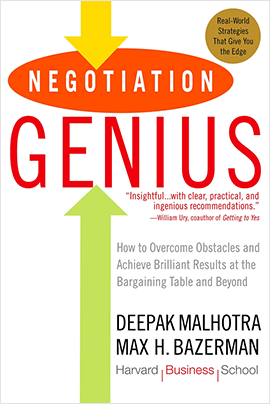 Publisher: Bantam Books
Publisher: Bantam Books
Year Published: 2008
Number of Pages: 352
A common caricature of a skilled negotiator is a person with a dominant, forceful personality who loves a good fight. Anyone without these characteristics may well conclude that negotiating just isn’t for them.
Deepak Malhotra and Max Bazerman fight against this notion in their book, Negotiating Genius. Negotiators aren’t born; rather, they’re made.
“One problem we’ve encountered is the belief that people are either good or bad at negotiation and little can be done to change that….we could not disagree more.”
Nor do they agree with a belief that negotiation is all about instinct; rather, it’s about strategy.
The book persuades the reader that negotiation is a skill that anyone can learn and develop, and it provides a framework to turn him or her into a “negotiating genius.”
Its lessons include identifying the “ZOPA” zone, the zone of possible agreement, and leveraging within this range.
The authors are Harvard professors and have researched negotiation for decades.
The text is pretty dense, but they begin with several true stories where characters overcome huge obstacles through deft and shrewd negotiation—but they don’t explain how until later in the book. This keeps you turning pages. Some readers even found the book gripping and couldn’t put it down.
The Art of the Deal by Donald J. Trump with Tony Schwartz
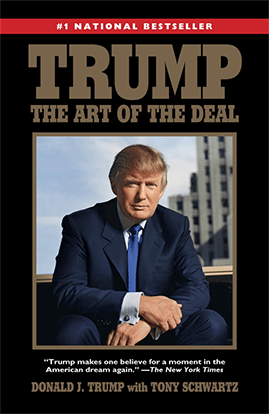 Publisher: Ballantine Books
Publisher: Ballantine Books
Year Published: 1987
Number of Pages: 384
“Deals are my art form. Other people paint beautifully on canvas or write wonderful poetry. I like making deals, preferably big deals. That’s how I get my kicks.”
From building The Trump Plaza and Casino in Atlantic City, to the Trump Tower and The Grand Hyatt in Manhattan, Donald Trump has indeed spent much of his time in the upper-echelons of real-estate deals.
Published in 1987, Art of the Deal stayed on the New York Times bestseller list for 48 weeks, reaching #1 for 13 weeks. Even now, over thirty years later, it’s still a good read for anyone looking to sharpen her negotiation skills.
“You can’t be scared, you do your thing, you hold your ground, you stand up tall, and whatever happens, happens.”
In Art of the Deal, Trump retells the minutiae of his daily schedule, revealing how his deals begin, evolve and close. He takes a trust-your-gut approach to negotiation and doesn’t plan his days, but keeps them open to allow opportunities to present themselves.
“You can’t be imaginative or entrepreneurial if you’ve got too much structure.”
Much of this book is a memoir of Trump’s illustrious career, and chapter titles include: “Growing Up,” “The Move to Manhattan” and “Trump Tower: the Tiffany Location”
Trump served as the 45th President of the United States. He’s written several other books, including Think Like a Billionaire and The Art of the Comeback. Tony Schwartz is the CEO of The Energy Project.
Although the takeaways are written between the lines in Art of the Deal, many readers have benefited from learning Trump’s negotiation methods.
Getting to Yes: Negotiating Agreement Without Giving In by Roger Fisher and William Ury and Bruce Patton
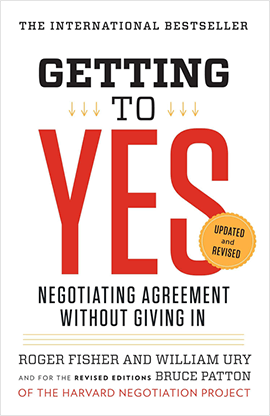 Publisher: Penguin
Publisher: Penguin
Year Published: 2011
Number of Pages: 240
In Getting to Yes, authors Roger Fisher and William Fry argue for a “third way” of negotiation. It isn’t “soft” negotiating, which entails avoiding confrontation and conceding quickly. Nor is it “hard” negotiating, which entails running the other person down through sheer force of will.
This third way they call “principled negotiating,” in which “you look for mutual gains whenever possible, and that where your interests conflict, you should insist that the result be based on some fair standards independent of the will of either side…it shows you how to obtain what you are entitled to and still be decent.”
Their method is helpful for someone who’s shy of negotiating or who thinks it’s too aggressive. It advocates behaving civilly and not burning any bridges during a negotiation. It also covers how to negotiate when the other person is a crook.
The authors are Harvard professors and part of the Harvard Negotiation Process.
Getting to Yes was a best seller in 1981, and they came out with the third edition in 2011. It includes a section that answers common questions they’ve received since the initial publication, including: “What if the other side believes in a different standard of fairness?” and “How do I try these ideas out without taking too much risk?”
Although some readers find the examples dated, it’s a useful book for amping up your negotiation skills in daily life.
Checkers or Battleship
No one becomes an expert negotiator overnight. It’s like the piano. You don’t get good at it unless you sit down every night and work on those scales.
Opportunities to develop negotiation skills present themselves all the time, from hiring employees to buying a car to discussing dinner plans with a spouse. As Fisher and Ury write in Getting to Yes, “Every negotiation is different, but the basic elements do not change.”
Negotiating is about earning your share and getting what you deserve. It is so implicit to our everyday life, that it’s one of those life skills we can hardly afford to not develop.
So whether you’re discussing with your best friend forever whether to have surf or turf for dinner, or vying with conniving businessmen for the penthouse suite at the office building on town square, remember that you only get what you ask for. So make every effort to plan and strategize. Then sit down, and calmly and slowly talk it through.

